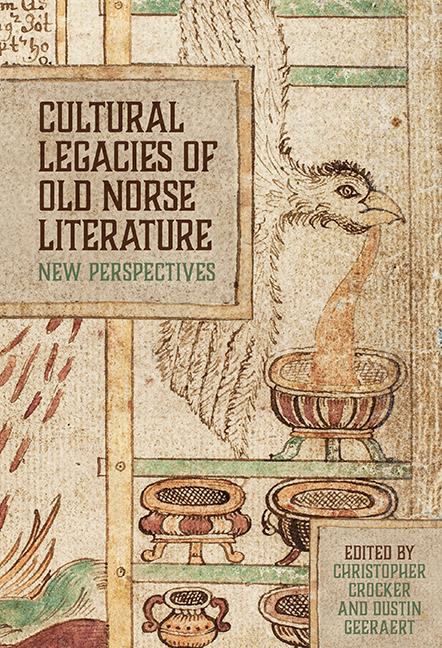Book contents
- Frontmatter
- Contents
- List of Illustrations
- List of Contributors
- Foreword: Old Norse and the Porous Boundaries of Medievalism
- Acknowledgements
- Note on the Text
- Introduction
- 1 Dr Jekyll and Mr Hyde in Medieval Iceland: Saga Realism and the Sworn Brothers
- 2 The Malleability of the Past: Íslendingabók as Narrative History
- 3 Women’s Work and Material Culture in Medieval Iceland: Gender, Narrative, and Cloth Production
- 4 Vafþrúðnismál, from Parchment to Print: Stability and Change in the Transmission of Eddic Poetry
- 5 The Odinic Motif: The Wanderer in the Mist
- 6 What has Darwin to do with Óðinn? Shapeshifting, God, and Nature in the ‘Great Story of the North’
- 7 Madness, Mythology, and Mitteleuropa: Günter Grass’s Transformation of Old Norse Myth in The Tin Drum
- 8 Once More, with Fiction: Transforming Myth in Gerður Kristný’s Blóðhófnir and the Eddic Poem Skírnismál
- Afterword: Ethnographic Medievalisms
- Bibliography
- Index
Afterword: Ethnographic Medievalisms
Published online by Cambridge University Press: 08 October 2022
- Frontmatter
- Contents
- List of Illustrations
- List of Contributors
- Foreword: Old Norse and the Porous Boundaries of Medievalism
- Acknowledgements
- Note on the Text
- Introduction
- 1 Dr Jekyll and Mr Hyde in Medieval Iceland: Saga Realism and the Sworn Brothers
- 2 The Malleability of the Past: Íslendingabók as Narrative History
- 3 Women’s Work and Material Culture in Medieval Iceland: Gender, Narrative, and Cloth Production
- 4 Vafþrúðnismál, from Parchment to Print: Stability and Change in the Transmission of Eddic Poetry
- 5 The Odinic Motif: The Wanderer in the Mist
- 6 What has Darwin to do with Óðinn? Shapeshifting, God, and Nature in the ‘Great Story of the North’
- 7 Madness, Mythology, and Mitteleuropa: Günter Grass’s Transformation of Old Norse Myth in The Tin Drum
- 8 Once More, with Fiction: Transforming Myth in Gerður Kristný’s Blóðhófnir and the Eddic Poem Skírnismál
- Afterword: Ethnographic Medievalisms
- Bibliography
- Index
Summary
In the introduction to his own first detailed engagement with medieval Germanic literature, Jorge Luis Borges states:
At some point, sooner or later, students of the novel will recognize the importance of the saga for its origins. Someday the history of the metaphor will be written, acknowledging that Old Icelandic texts anticipated some of the excesses of the seventeenth and twentieth centuries.
On the details it is not entirely clear that Borges’ prediction that sagas would be recognised for their complexity of character and plot, their development of sustained themes and arguments, has been fully realized, nor that the metaphors or kennings of Old Norse bear comparison with the rococo or baroque excesses of the seventeenth century in Europe or with the ultra-modernists who briefly held sway in Spain in the early twentieth century. However, he had it right with his underlying argument that Norse mythology and Norse tales would be recognised and emulated, would become popular figures and stories of the chosen genres of the early twentieth century. The papers in this volume powerfully demonstrate the continuing valence of the figures of Þórr and Óðinn and Loki, the frost giants and the perpetual warriors of Valhalla, the striking images of creation and destruction, and the dramatic confrontations and emotion-charged epiphanies of the sagas. These analyses explore texts and their histories, whether their textual histories and intersections in various manuscripts and print runs, or their revisiting of individual motifs from Norse legend and saga reconstructed into a new work of fiction, or their tracing of a motif or concept from Norse saga through to modern revisionings – and especially feminist reconstructions – of the earlier materials. Sometimes these studies dance with the rich possibilities of a particular symbol or figure, and sometimes they move more obviously into the psychological dramas of Old Norse texts and their modern inheritors with their unreliable narrators, solipsistic protagonists, and symbolic confrontations. Where often past commentators on Old Norse materials have seen realism, or possibly magic realism, the contributors to this volume look deeper and see prototypical stories imbricated with ragnarøkr (engulfing doom).
- Type
- Chapter
- Information
- Cultural Legacies of Old Norse LiteratureNew Perspectives, pp. 181 - 190Publisher: Boydell & BrewerPrint publication year: 2022



